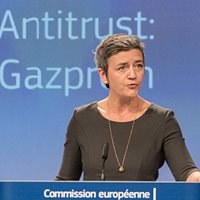(BRUSSELS) – The EU Commission settled its antitrust dispute with Russia’s Gazprom Thursday, imposing conditions on the state-controlled energy giant to enable free flow of gas ‘at competitive prices’ in east European gas markets.
“Today’s decision removes obstacles created by Gazprom, which stand in the way of the free flow of gas in Central and Eastern Europe.,” said the EU’s Competition Commissioner Margrethe Vestager: “But more than that our decision provides a tailor-made rulebook for Gazprom’s future conduct. It obliges Gazprom to take positive steps to further integrate gas markets in the region and to help realise a true internal market for energy in Europe.And it gives Gazprom customers in Central and Eastern Europe an effective tool to make sure the price they pay is competitive.”
Ms Vestager added that the decision was not about the “flag of the company” – Gazprom is state-owned – it is about “achieving the outcome that best serves European consumers and businesses”.
Gazprom is the dominant gas supplier in a number of Central and Eastern European countries. In April 2015, the Commission sent a Statement of Objections to Gazprom. It set out the Commission’s preliminary view that the company breached EU antitrust rules by pursuing an overall strategy to partition gas markets along national borders in eight Member States (Bulgaria, the Czech Republic, Estonia, Hungary, Latvia, Lithuania, Poland and Slovakia). This strategy may have enabled Gazprom to charge higher gas prices in five of these Member States (Bulgaria, Estonia, Latvia, Lithuania and Poland).
Today’s Commission decision puts an end to this behaviour by Gazprom. Furthermore, it imposes on Gazprom a detailed set of rules that will significantly change the way Gazprom operates in Central and Eastern European gas markets:
- No more contractual barriers to the free flow of gas: Gazprom has to remove any restrictions placed on customers to re-sell gas cross-border.
- Obligation to facilitate gas flows to and from isolated markets: Gazprom will enable gas flows to and from parts of Central and Eastern Europe that are still isolated from other Member States due to the lack of interconnectors, namely the Baltic States and Bulgaria.
- Structured process to ensure competitive gas prices: Relevant Gazprom customers are given an effective tool to make sure their gas price reflects the price level in competitive Western European gas markets, especially at liquid gas hubs.
- No leveraging of dominance in gas supply: Gazprom cannot act on any advantages concerning gas infrastructure, which it may have obtained from customers by having leveraged its market position in gas supply.
Combined, the Commission says these obligations address its competition concerns and achieve its objectives of enabling the free flow of gas in Central and Eastern Europe at competitive prices.
The Commission has decided to make these obligations (so-called “commitments”) legally binding on Gazprom (under Article 9 of the EU’s antitrust Regulation 1/2003).
If a company breaks any of these obligations, the Commission can impose a fine of up to 10% of the company’s worldwide turnover, without having to prove an infringement of EU antitrust rules.
More information on the Commission’s decision will be available on its competition website in the public case register under the case number AT.39816.




